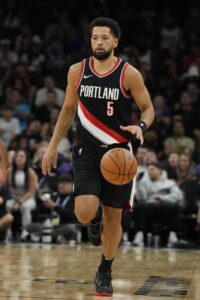As the NBA’s 2024 trade deadline approaches, it’s worth keeping in mind which teams hold traded player exceptions that could come in handy to grease the wheels on an in-season deal.
As we explain in our glossary, a traded player exception allows a team to take on salary in a trade without sending out any salary in return. The amount of the exception (plus $250K) is the amount of salary the team is permitted to take back without salary-matching – either in a single deal or in multiple trades – for one year.
[RELATED: Salary-Matching Rules For Trades During 2023/24 Season]
For instance, a team with a $10MM trade exception could acquire a player earning $4MM and a player earning $6.25MM without having to worry about sending out any outgoing salary.
In recent years, sizable traded player exceptions have served as wild cards that helped accommodate both pre-deadline and offseason deals. For example, after creating a $17MM trade exception when they sent Davis Bertans to the Thunder and moved down a couple spots in the 2023 draft lottery, the Mavericks used that TPE to acquire Richaun Holmes along with an additional first-round pick later in the night.
Many trade exceptions expire without being used, but as our tracker shows, there are many sizable ones available this season that could be useful when trade season begins in earnest.
Here are the 20 most valuable trade exceptions around the NBA for now, along with their expiry dates in parentheses:
- Atlanta Hawks: $23,019,560 (7/8/24)
- Brooklyn Nets: $19,928,571 (7/8/24)
- Brooklyn Nets: $18,131,946 (2/9/24)
- Washington Wizards: $12,354,400 (6/24/24)
- Washington Wizards: $9,800,926 (7/8/24)
- Miami Heat: $9,450,000 (7/8/24)
- Portland Trail Blazers: $8,778,377 (9/27/24)
- Portland Trail Blazers: $8,300,000 (2/9/24)
- Memphis Grizzlies: $7,492,540 (7/8/24)
- Miami Heat: $7,243,842 (7/8/24)
- Philadelphia 76ers: $6,831,413 (11/1/24)
- New York Knicks: $6,803,012 (7/8/24)
- Brooklyn Nets: $6,802,950 (7/8/24)
- Phoenix Suns: $6,500,000 (7/17/24)
- Boston Celtics: $6,202,500 (7/12/24)
- Washington Wizards: $5,379,250 (6/24/24)
- Phoenix Suns: $4,975,371 (2/9/24)
- Dallas Mavericks: $4,953,980 (7/8/24)
- Miami Heat: $4,700,000 (2/7/24)
- Houston Rockets: $4,510,000 (10/17/24)
Those Hawks and Nets trade exceptions are big enough to be genuine assets, but I wouldn’t expect either club to make full use of them during the season. Both Atlanta and Brooklyn are about $8-10MM away from the luxury tax line and would move even closer to becoming taxpayers if certain players on their rosters earn bonuses currently considered unlikely.
Neither team is close enough to title contention to warrant becoming a taxpayer this season unless it’s for a major, major acquisition, so don’t count on either the Hawks or Nets using a TPE to bring in a $15MM role player with no outgoing salary.
The luxury tax looms as an issue for some of the other teams on this list as well, but there are some intriguing TPEs to keep an eye on. Would-be contenders like the Sixers, Celtics, and Suns may consider using their exceptions to try to fortify their benches ahead of the postseason, while a rebuilding team like the Wizards – with nearly $30MM in breathing room below the tax – could be a dumping ground for an unwanted contract — as long as that contract comes attached to a draft asset or two.
Teams like the Lakers and Pelicans, who are just narrowly over the tax threshold and could duck below by trading a single player, are potential trade partners to watch for Washington.
It’s worth noting that some of these exceptions may be used in a deal that could otherwise be completed using salary matching. For instance, a team with a $10MM trade exception that swaps one $8MM player for another could use the exception to take on the incoming player and create a new $8MM exception using the outgoing player.
 Portland’s backcourt has been hit hard by injuries early on in 2023/24, with Scoot Henderson (ankle), Malcolm Brogdon (hamstring strain) and Anfernee Simons (thumb surgery) all missing time. In their stead, head coach Chauncey Billups turned to Mays on Wednesday at Sacramento and he played well, recording 18 points (on 8-of-15 shooting), 11 assists (against three turnovers) and two steals in 37 minutes of action.
Portland’s backcourt has been hit hard by injuries early on in 2023/24, with Scoot Henderson (ankle), Malcolm Brogdon (hamstring strain) and Anfernee Simons (thumb surgery) all missing time. In their stead, head coach Chauncey Billups turned to Mays on Wednesday at Sacramento and he played well, recording 18 points (on 8-of-15 shooting), 11 assists (against three turnovers) and two steals in 37 minutes of action.